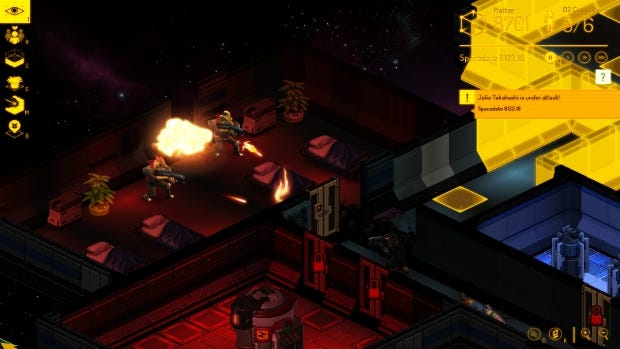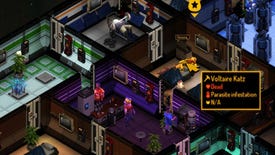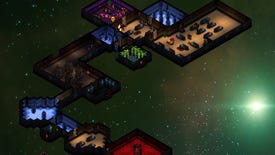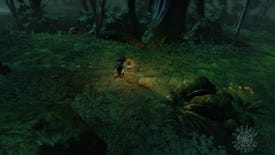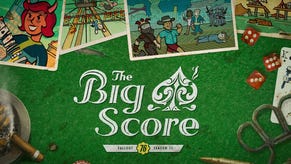Reveal: Double Fine's Sci-Fi Dwarf Fortress, Spacebase DF-9
Space (Chicken) Invaders
Double Fine does not, cannot, will not stop. Not for me, not for you, not for Death (which is why we'll probably never see another Grim Fandango). Recently, we've seen the international house of chuckles both branch out from and return to its roots in Massive Chalice and Broken Age, respectively, but let's not forget about Amnesia Fortnight. Last year, Tim Schafer and co teamed up with Humble Bundle to let players vote on prototypes, essentially deciding which games would win a golden ticket into full-scale development. Spacebase DF-9 is set to be the first fruit of those labors, and what a delectable thing it's looking to be. Think Dwarf Fortress, but (for now) a bit simpler, far easier to parse, and in space. Oh, and it should be on Steam Early Access riiiight abouuuut... now. Video walkthrough with project lead JP LeBreton, interview, and more below.
(And here's a trailer for a closer, much cleaner look at Spacebase's graphical style and interface.)
RPS: You're not just going to Steam Early Access. It's how you've decided to announce your game. Obviously, getting your community in early is important to you, but how so? Are they going to decide the game's entire direction, or just smaller aspects of it?
LeBreton: Definitely the latter. Broken Age's Kickstarter, unlike many Kickstarters since then, was just Tim going, "There's a game I want to make. I don't know quite what it is yet, but do you trust me? By donating, you say you want me to make another adventure game." And of course, the answer was yes. People wanted another adventure game, even though they didn't know what it was. But there's still a lot of implicit trust there [of Tim].
But I think, generally speaking, you've really got to know what kind of game you're making and where you want to go with it. As a creator. Otherwise, even if you're getting great feedback from your community, if you don't have guiding principles with which to interpret that feedback, you can really end up in the weeds. And I think there are some games that have probably ended up there. So I think we know where we're going and those sorts of ideals - what's really interesting about the game. That stuff, we're trusting our gut on. But all the other stuff, like usability and specific features, that's the sort of stuff that we absolutely want to listen to our players on.
And a lot of times, the stuff players give you feedback on will echo where you're already headed internally as a team. We have a super collaborative process where everyone contributes design input, and that's been really good. We've benefited from more than just my expertise as a designer.
RPS: Dwarf-Fortress-style simulations are great on many levels, but arguably at their most entertaining when everything's going spectacularly wrong. What kind of terrible horrors lurk in the deepest reaches of space?
LeBreton: As an example of one of the bad things that can happen, some of the people who'll immigrate to your base, you might not know where they've come from. You can look in their spacebase log. and it might occasionally say, "Yeah, I'm just not feeling right. Must be something I ate, I guess." And then, before long, boom, you get a parasite bursting out of them. And now you've got this horrible carnivorous monster loose in the base.
Other times, you'll go into a derelict ship, and you'll find a few dead people and be like, "Oh gosh, what happened here?" You might find some monsters or, like, a party of enemy raider aliens or something like that. Those sorts of things can just show up when a ship docks at your base or something like that. So yeah, stuff like that.
RPS: What do you have planned as the most catastrophic thing that could possibly happen?
LeBreton: We don't have meteor strikes in right now, [but we hope to]. That's probably not the most catastrophic thing, though. That's the interesting thing about this game: because it's so driven by emergent variables, even the most innocuous thing could [spell doom for everyone]. One person getting unhappy could end up being this huge thing. Like, in Dwarf Fortress, there are these things called Tantrum Spirals. If one person dies, and another character was friends with that person, they can go into this tantrum. They'll start being angry, and then they'll make other people around them angry until your entire base is just at each other's throats and killing each other.
In Spacebase, one person being unhappy could lead to a fire, and if you didn't plan your base well, that fire could [ruin everything]. Fires can burn through the hull if you don't put them out quickly, and then you've got this breach in your base. So then you have to send people out into space to repair that breach, and all the while oxygen is leaking out. Maybe that taxes your oxygen system in a way that leads you to run out of that.
So yeah, in these emergent sim type games, it's always the dominoes. Any one of those things could be the initial domino. But we've built these systems to lend a gravity and inertia to it. The oxygen system was one of the first things we added to it because, OK, you're in deep space, and what's interesting about that? The film Gravity was this amazing reminder that, oh yeah, right, when you're in space you're really, really worried about air and pressure. So the future focus of the game is going to be about building those systems that allow for more things to go wrong but also give players tools to stay on top of that chaos.
RPS: Are all species star chickens, or was that just a bug in your demo code? Please say it wasn't a bug.
LeBreton: Everybody's secretly a chicken. There's gonna be a big reveal: "By the way, you were chickens the whoooooole time."
No, this was just a bug with our little portrait graphic thing. There are totally chickens, though. I promise you there are star chickens.
RPS: How deep do you want these systems to go? How many tiny, weird little factors will be influencing the people and un-people on your base? Like, I've read so many stories of insane possibilities in Dwarf Fortress. Dwarves going insane, killing their best friends, smelting their bones into armor, and then getting killed by resulting ghosts. That kind of thing.
LeBreton: Yeah, exactly! So I think there's a similar thing here, although that example sounds like it comes from Dwarf Fortress' people simulation. One thing we want to add in an update (hopefully coming very soon) is the concept of objects people carry around, because Dwarf Fortress' bases - in addition to being for people and structures - are full of stuff. You can have, like, a wheel of cheese or a kitten skull. And all these items become props in this much larger thing of meaning. So getting support for that in is really important. We're not there yet, but we hope to be soon.
RPS: Some games have followed in Dwarf Fortress' footsteps, but not all that many, in the grand scheme of things. And of them, few have really left a mark. Why do you think that is?
LeBreton: I think there's some games that have come up that haven't gone away Things like Prison Architect and RimWorld that are still in active development and have a lot of potential to cross over. It's really partly just a matter of time, because it takes a lot of time to build in all the simulation complexity.
In Dwarf Fortress' case, it was kind of the Minecraft factor too. The person who did it first did it first, and the people who made subsequent games like it are digging around for their own takes on it. And also, if you're a guy in the middle of Kansas or wherever Dwarf Fortress' creator is and you really do have ten years to spend embroidering a game with this absurd level of simulation complexity, you can do so much. And now he's going on this huge odyssey through procedural world generation and armies marching and just all this stuff. Having the time to explore that counts for a whole lot.
RPS: Is that where Steam Early Access enters the picture for you? I mean, I've spoken with devs and critics who think the big downfall of these early access programs will come when games launch and no one cares enough to play them anymore. The thinking is that they'll have already gotten their fill during alpha or beta. But if the simulation grows enough...
LeBreton: That's why alpha funding makes sense for us. If you get that initial fanbase, then you can keep developing it. What we've seen is that, if you do have that critical mass of gameplay and simulation interest, it's not a dwindling amount of interest [over time]. It's an increasing amount of interest, because your game becomes capable of more - telling more interesting stories. It's attracting new people.
I mean, I found out about Dwarf Fortress in 2007 and first started playing it in 2008. It was still at an early point there. Since then, it's [gone much further]. It recently got written up by The New York Times and went into a museum exhibit. So in a lot of simulation games, the developer just needs time to develop stuff. It's weird. It's kind of this Sistine-Chapel-like labor where, every day, you add some little new thing to the game. Some wrinkles to it. And interesting little stories can fall out of those wrinkles.
RPS: If all the stars align and you get everything the way you want it, how long are you hoping to work on new stuff for Spacebase?
LeBreton: [laughs] There's no specific time in mind because estimating how long it would take to make a game is one of the hardest things to do in the universe, apparently. I think it's more just, like, you'll see on our website that we'll have the full dev plans. And we're probably gonna add stuff to that and also take some stuff away from that. That's the most expanded version of the game, so when all of that is in, we could conceivably call it "done." There'd be no more we could possibly add to the game.
But until then, it's like we're just alpha one, alpha two, alpha three - however long we can keep going, based on how much people like it.
RPS: Do you plan on developing other Amnesia Fortnight games this way, or does each one from the most recent batch have its own path to completion?
LeBreton: Alpha funding isn't a panacea for all types of games. I think it was just a particularly good fit for this one. There are other games that are probably more story driven.
Brand manager/producer/giant Greg Rice: Yeah, I think it's definitely whatever's best for each game. In this case, it was the perfect fit.
RPS: Are the other Amnesia Fortnight games in active development right now, or are you only doing one - in this case, Spacebase - at a time?
Rice: This is the only one that's currently in active development.
RPS: Thank you for your time.
